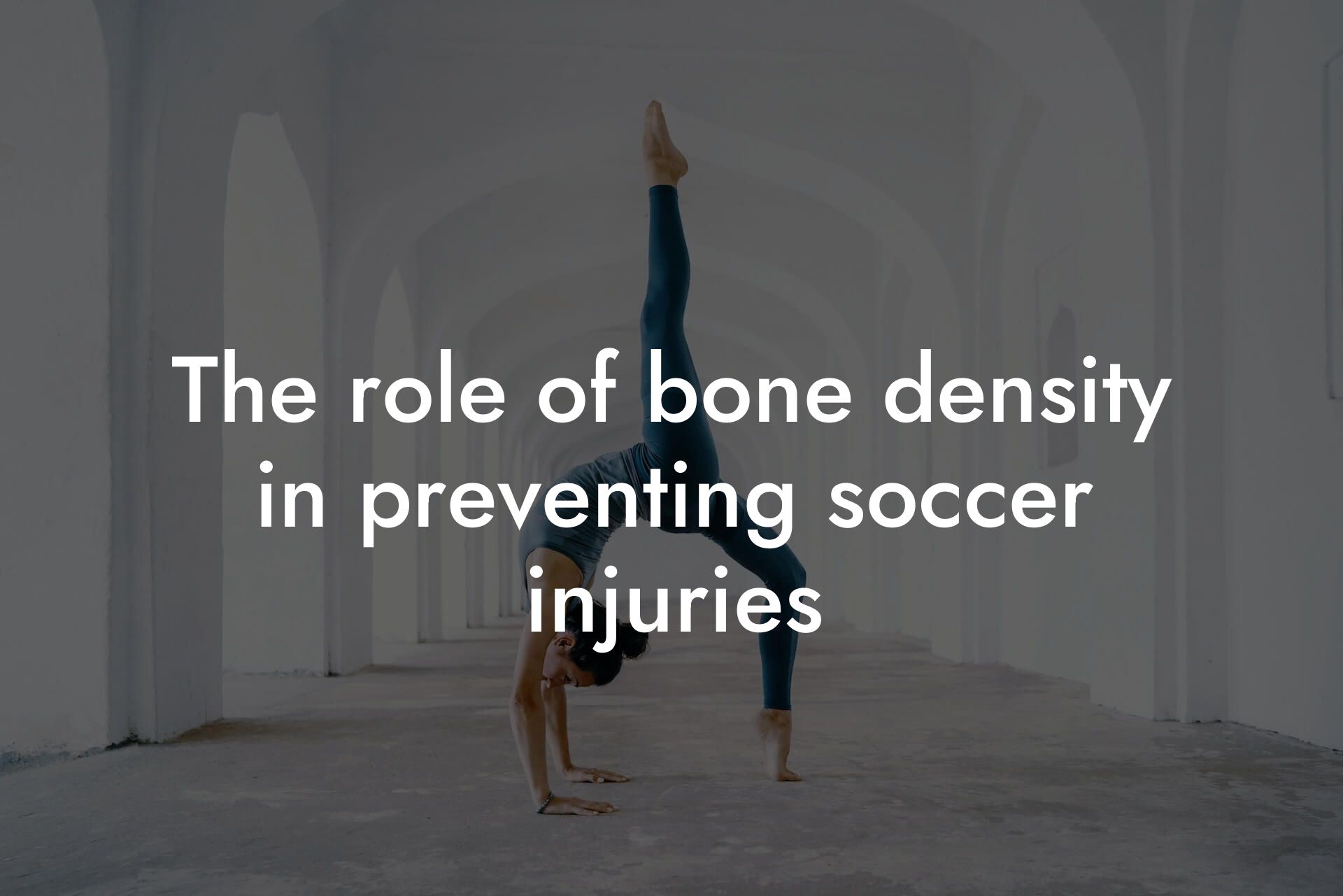As a high-earning professional, you understand the importance of maintaining a healthy and fit physique to excel in your career. However, if you're an avid soccer player, you know that having a good physique is not just about aesthetics, but also about performance. Body composition plays a critical role in determining your speed and stamina on the field. In this article, we'll delve into the world of body composition and explore how it affects your soccer performance.
Table of Contents
- What is Body Composition?
- The Impact of Body Fat on Soccer Performance
- The Role of Lean Mass in Soccer Performance
- The Ideal Body Composition for Soccer Players
- How to Optimize Your Body Composition for Soccer
- The Benefits of DEXA Scanning for Soccer Players
- Take the First Step Towards Optimizing Your Body Composition
- Frequently Asked Questions
What is Body Composition?
Body composition refers to the percentage of fat and lean mass in your body. Lean mass includes muscle, bone, and water, while fat mass includes body fat. Having a healthy body composition is essential for overall health and athletic performance. A DEXA scan is a reliable method to measure body composition, providing accurate readings of fat mass, lean mass, and bone density.
The Impact of Body Fat on Soccer Performance
Excess body fat can significantly hinder your soccer performance. Carrying extra weight can decrease your speed, agility, and endurance, making it challenging to keep up with the demands of the game. Additionally, excess body fat can increase your risk of injury, particularly in the joints. A high body fat percentage can also affect your power-to-weight ratio, making it harder to accelerate and decelerate quickly.
The Role of Lean Mass in Soccer Performance
Lean mass, on the other hand, is essential for soccer performance. Muscle mass, in particular, plays a critical role in generating power, speed, and endurance. Having a high percentage of lean mass can improve your acceleration, deceleration, and overall speed. Moreover, lean mass helps to reduce your risk of injury, as it provides additional support and stability to your joints.
The Ideal Body Composition for Soccer Players
The ideal body composition for soccer players varies depending on factors such as age, sex, and position. However, a general guideline is to aim for a body fat percentage between 10-15% for men and 15-20% for women. In terms of lean mass, soccer players should aim to have a high percentage of muscle mass, particularly in the legs, core, and glutes.
How to Optimize Your Body Composition for Soccer
To optimize your body composition for soccer, focus on a combination of proper nutrition, training, and recovery. A balanced diet that includes plenty of protein, complex carbohydrates, and healthy fats can help support muscle growth and fat loss. Incorporate strength training exercises that target your legs, core, and glutes, and include high-intensity interval training (HIIT) to improve your speed and endurance. Adequate recovery, including proper sleep and stretching, is also essential to allow your body to adapt to the demands of the game.
The Benefits of DEXA Scanning for Soccer Players
A DEXA scan can provide valuable insights into your body composition, allowing you to identify areas for improvement. By tracking changes in your body composition over time, you can adjust your training and nutrition plan to optimize your performance. Additionally, a DEXA scan can help identify potential risks for injury, allowing you to take proactive measures to prevent them.
In conclusion, body composition plays a critical role in determining your speed and stamina on the soccer field. By understanding the importance of body composition and taking steps to optimize it, you can improve your overall performance and reduce your risk of injury. As a high-earning professional, investing in a DEXA scan and working with a qualified coach or trainer can help you take your game to the next level.
Take the First Step Towards Optimizing Your Body Composition
At Tano Performance Group, we understand the importance of body composition for soccer performance. Our state-of-the-art DEXA machine provides accurate and reliable readings of body composition, allowing you to make informed decisions about your training and nutrition plan. Contact us today to schedule your DEXA scan and take the first step towards optimizing your body composition for soccer.
Frequently Asked Questions
What is body composition, and how does it relate to soccer performance?
Body composition refers to the percentage of fat and lean mass in the body. In soccer, having a high percentage of lean mass and low body fat can improve speed, agility, and endurance. A well-balanced body composition can also reduce the risk of injuries and enhance overall athletic performance.
How does excess body fat affect soccer performance?
Excess body fat can negatively impact soccer performance by increasing the energy expenditure required for movement, reducing speed and agility, and decreasing endurance. Additionally, excess body fat can also increase the risk of injuries, particularly in the joints.
What is the ideal body fat percentage for soccer players?
The ideal body fat percentage for soccer players varies depending on the position and individual goals. Generally, a body fat percentage between 6-13% is considered optimal for male soccer players, while 16-23% is considered optimal for female soccer players.
How does lean mass affect soccer performance?
Lean mass, which includes muscle mass, bone density, and water, plays a crucial role in soccer performance. Having a high percentage of lean mass can improve speed, power, and endurance, allowing soccer players to perform at a higher intensity for longer periods.
What is the relationship between bone density and soccer performance?
Bone density is an important aspect of body composition that affects soccer performance. Having high bone density can reduce the risk of injuries, particularly fractures, and improve overall athletic performance. Soccer players with high bone density tend to have better speed, agility, and endurance.
How can I measure my body composition?
There are several ways to measure body composition, including dual-energy X-ray absorptiometry (DXA), skinfold measurements, bioelectrical impedance analysis (BIA), and hydrostatic weighing. It's essential to consult with a healthcare professional or certified fitness expert to determine the best method for your individual needs.
What is the impact of body composition on speed in soccer?
Body composition has a significant impact on speed in soccer. Having a high percentage of lean mass and low body fat can improve acceleration, deceleration, and overall speed. Soccer players with a well-balanced body composition tend to be faster and more agile on the field.
How does body composition affect endurance in soccer?
Body composition plays a critical role in endurance in soccer. Having a high percentage of lean mass and low body fat can improve cardiovascular endurance, allowing soccer players to sustain a high intensity over a longer period. Additionally, a well-balanced body composition can reduce fatigue and improve overall athletic performance.
Can body composition be improved through training and nutrition?
Yes, body composition can be improved through a combination of proper training and nutrition. A well-structured training program that includes strength training, cardiovascular exercise, and high-intensity interval training (HIIT) can help improve lean mass and reduce body fat. Additionally, a balanced diet that is high in protein, moderate in carbohydrates, and low in fat can support muscle growth and fat loss.
How long does it take to see improvements in body composition?
The time it takes to see improvements in body composition varies depending on individual factors, such as starting point, training program, and nutrition plan. Generally, noticeable improvements can be seen within 6-12 weeks of consistent training and nutrition.
What is the role of nutrition in body composition for soccer players?
Nutrition plays a critical role in body composition for soccer players. A well-balanced diet that is high in protein, moderate in carbohydrates, and low in fat can support muscle growth, fat loss, and overall athletic performance. Additionally, proper hydration and electrolyte balance are essential for optimal performance.
How can I maintain a healthy body composition during the soccer season?
Maintaining a healthy body composition during the soccer season requires a combination of proper training, nutrition, and recovery strategies. This includes prioritizing strength training, cardiovascular exercise, and HIIT, as well as fueling the body with a balanced diet and staying hydrated.
What are the risks of having poor body composition in soccer?
Poor body composition can increase the risk of injuries, reduce athletic performance, and negatively impact overall health. Soccer players with poor body composition may experience decreased speed, agility, and endurance, as well as increased fatigue and muscle soreness.
How can I improve my body composition as a soccer player?
Improving body composition as a soccer player requires a comprehensive approach that includes proper training, nutrition, and recovery strategies. This includes prioritizing strength training, cardiovascular exercise, and HIIT, as well as fueling the body with a balanced diet and staying hydrated.
What is the relationship between body composition and injury risk in soccer?
Body composition plays a significant role in injury risk in soccer. Having a high percentage of lean mass and low body fat can reduce the risk of injuries, particularly in the joints. Additionally, a well-balanced body composition can improve overall athletic performance and reduce the risk of overuse injuries.
Can body composition be improved through supplements and ergogenic aids?
While supplements and ergogenic aids may be helpful in improving body composition, they should not be relied upon as the sole means of improvement. A well-balanced diet and comprehensive training program should be the foundation of any body composition improvement plan.
How does body composition affect mental performance in soccer?
Body composition can have a significant impact on mental performance in soccer. Having a well-balanced body composition can improve confidence, reduce anxiety and stress, and enhance overall mental toughness.
What is the ideal body composition for goalkeepers in soccer?
The ideal body composition for goalkeepers in soccer is slightly different than for outfield players. Goalkeepers require a higher percentage of lean mass to support their explosive power and agility, as well as a lower body fat percentage to improve their reaction time and speed.
How can I monitor my body composition progress?
Monitoring body composition progress can be done through regular measurements of body fat percentage, lean mass, and other metrics. Additionally, tracking progress through performance metrics, such as speed, agility, and endurance, can provide valuable insights into the effectiveness of a body composition improvement plan.
What are the benefits of having a well-balanced body composition in soccer?
The benefits of having a well-balanced body composition in soccer include improved speed, agility, and endurance, as well as reduced injury risk and improved overall athletic performance. Additionally, a well-balanced body composition can enhance mental performance, reduce fatigue, and improve overall health and well-being.
How can I get started with improving my body composition for soccer?
Getting started with improving body composition for soccer requires a comprehensive approach that includes proper training, nutrition, and recovery strategies. Consult with a healthcare professional or certified fitness expert to develop a personalized plan that meets your individual needs and goals.
Here are some related articles you might love...
- Off-season training strategies for soccer players
- Using DEXA scans to monitor soccer player health and performance
- The role of bone density in preventing soccer injuries
- Reducing body fat to enhance soccer agility
- Balancing endurance and strength in soccer
- Hydration and recovery tips for soccer athletes
- Nutrition tips for maintaining energy levels during soccer matches
- Maintaining lean muscle mass for optimal soccer performance
- Strength and conditioning programs for soccer players
Zak Faulkner
Zak Faulkner is a leading authority in the realm of physical health and body composition analysis, with over 15 years of experience helping professionals optimise their fitness and well-being. As one the experts behind Tano Performance Group, Zak has dedicated his career to providing in-depth, science-backed insights that empower clients to elevate their physical performance and overall health.
With extensive knowledge of DEXA technology, Zak specializes in delivering comprehensive body assessments that offer precise data on body fat, muscle mass, bone density, and overall physique. His expertise enables individuals to make informed decisions and achieve their fitness goals with accuracy and confidence. Zak’s approach is rooted in a deep understanding of human physiology, combined with a passion for helping clients unlock their full potential through personalised strategies.
Over the years, Zak has earned a reputation for his commitment to excellence, precision, and client-focused service. His guidance is trusted by top professionals who demand the best when it comes to their health. Whether advising on fitness programs, nutritional strategies, or long-term wellness plans, Zak Faulkner’s insights are a valuable resource for anyone serious about taking their health and fitness to the next level.
At Tano Performance Group, Zak continues to lead our Content Team revolutionising how professionals approach their physical health, offering unparalleled expertise that drives real results.




